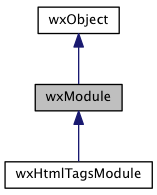#include <wx/module.h>
 Inheritance diagram for wxModule:
Inheritance diagram for wxModule:Detailed Description
The module system is a very simple mechanism to allow applications (and parts of wxWidgets itself) to define initialization and cleanup functions that are automatically called on wxWidgets startup and exit.
To define a new kind of module, derive a class from wxModule, override the wxModule::OnInit and wxModule::OnExit functions, and add the wxDECLARE_DYNAMIC_CLASS and wxIMPLEMENT_DYNAMIC_CLASS to header and implementation files (which can be the same file). On initialization, wxWidgets will find all classes derived from wxModule, create an instance of each, and call each wxModule::OnInit function. On exit, wxWidgets will call the wxModule::OnExit function for each module instance.
Note that your module class does not have to be in a header file.
For example:
Public Member Functions | |
| wxModule () | |
| Constructs a wxModule object. | |
| virtual | ~wxModule () |
| Destructor. | |
| virtual void | OnExit ()=0 |
| Provide this function with appropriate cleanup for your module. | |
| virtual bool | OnInit ()=0 |
| Provide this function with appropriate initialization for your module. | |
 Public Member Functions inherited from wxObject Public Member Functions inherited from wxObject | |
| wxObject () | |
| Default ctor; initializes to NULL the internal reference data. | |
| wxObject (const wxObject &other) | |
| Copy ctor. | |
| virtual | ~wxObject () |
| Destructor. | |
| virtual wxClassInfo * | GetClassInfo () const |
| This virtual function is redefined for every class that requires run-time type information, when using the wxDECLARE_CLASS macro (or similar). | |
| wxObjectRefData * | GetRefData () const |
| Returns the wxObject::m_refData pointer, i.e. the data referenced by this object. | |
| bool | IsKindOf (const wxClassInfo *info) const |
| Determines whether this class is a subclass of (or the same class as) the given class. | |
| bool | IsSameAs (const wxObject &obj) const |
| Returns true if this object has the same data pointer as obj. | |
| void | Ref (const wxObject &clone) |
| Makes this object refer to the data in clone. | |
| void | SetRefData (wxObjectRefData *data) |
| Sets the wxObject::m_refData pointer. | |
| void | UnRef () |
| Decrements the reference count in the associated data, and if it is zero, deletes the data. | |
| void | UnShare () |
| This is the same of AllocExclusive() but this method is public. | |
| void | operator delete (void *buf) |
The delete operator is defined for debugging versions of the library only, when the identifier WXDEBUG is defined. | |
| void * | operator new (size_t size, const wxString &filename=NULL, int lineNum=0) |
The new operator is defined for debugging versions of the library only, when the identifier WXDEBUG is defined. | |
Protected Member Functions | |
| void | AddDependency (wxClassInfo *dep) |
| Call this function from the constructor of the derived class. | |
| void | AddDependency (const char *classname) |
| Call this function from the constructor of the derived class. | |
 Protected Member Functions inherited from wxObject Protected Member Functions inherited from wxObject | |
| void | AllocExclusive () |
| Ensure that this object's data is not shared with any other object. | |
| virtual wxObjectRefData * | CreateRefData () const |
| Creates a new instance of the wxObjectRefData-derived class specific to this object and returns it. | |
| virtual wxObjectRefData * | CloneRefData (const wxObjectRefData *data) const |
| Creates a new instance of the wxObjectRefData-derived class specific to this object and initializes it copying data. | |
Additional Inherited Members | |
 Protected Attributes inherited from wxObject Protected Attributes inherited from wxObject | |
| wxObjectRefData * | m_refData |
| Pointer to an object which is the object's reference-counted data. | |
Constructor & Destructor Documentation
| wxModule::wxModule | ( | ) |
Constructs a wxModule object.
|
virtual |
Destructor.
Member Function Documentation
|
protected |
Call this function from the constructor of the derived class.
dep must be the wxCLASSINFO() of a wxModule-derived class and the corresponding module will be loaded before and unloaded after this module.
- Parameters
-
dep The class information object for the dependent module.
|
protected |
Call this function from the constructor of the derived class.
This overload allows a dependency to be added by name without access to the class info.
This is useful when a module is declared entirely in a source file and there is no header for the declaration of the module needed by wxCLASSINFO(), however errors are not detected until run-time, instead of compile-time, then. Note that circular dependencies are detected and result in a fatal error.
- Parameters
-
classname The class name of the dependent module.
|
pure virtual |
Provide this function with appropriate cleanup for your module.
|
pure virtual |
Provide this function with appropriate initialization for your module.
If the function returns false, wxWidgets will exit immediately.



